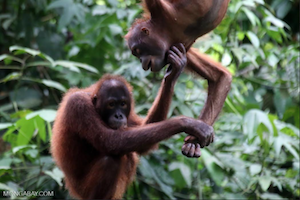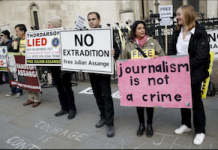
In 1993, Kinari Webb traveled to Borneo, Indonesia for the first time on a path to becoming a primatologist. What she learned there changed her career trajectory and her life. When she learned that local residents were cutting down trees in the rainforest to earn money specifically to pay for medical care, she decided to enroll in medical school, become a doctor and set up a primary care health center at the edge of one of Indonesia’s biodiverse national parks. People paid for care in-kind with seedlings, manure for organic farming or with handicrafts. Local people planted seedlings bought with funds contributed by supported around the world as a thank you to them for preserving the forest.
The core principles of the organization she founded, Health in Harmony, involve radical listening, rainforest community expertise, holistic and interdependent solutions, a decolonizing mindset, bridging global resources and data-driven scale.
Between The Lines’ Melinda Tuhus spoke with Webb about her new memoir, “Guardians of the Trees: A Journey of Hope Through Healing the Planet” and her organization’s ongoing efforts to preserve rainforests around the world, including their work in Madagascar and Brazil.
DR. KINARI WEBB: What we do is we listen to rainforest communities – we call it radical listening – and we implement precisely the solutions they would need to protect forests and thrive more themselves. This is really a planetary health approach, and I began to see this interconnection between environmental health and human health, when I spent a year in the rainforest studying orangutans in Borneo as an undergraduate. And there I discovered that people were logging to pay for health care, and that truth just shocked the core of my being, that people really had no choice, that they were in a Catch-22, that they really loved the forest, they recognized that the forest was essential for the current well-being and their future well-being. But, when someone in your family needs a C-section or your child is extremely sick, you will do whatever it takes to get the cash for health care, including destroy the future for that child and make your own future less healthy.
At that time, even the concept of planetary health didn’t really exist, and I didn’t really hear people talking about how we needed to marry human health and environmental health, but the communities where I was working understood this without question. It was completely and totally obvious to them.
So, I ended up going to medical school and went back to work together with these communities to work toward a healthy planet for all of us. So it was right on the edge of the national park — there’s a population of about 120,000 people who live around the park. The carbon in that forest alone – which is not the only value of rainforests, you know, half the world’s biodiversity, very important for water cycling, etc. — the carbon alone in that forest is equal to 14 years of carbon emissions from San Francisco.
So, if you look over the first 10 years of our program, there was a 90 percent drop in logging households. Monica Nirmala, who is the executive director of our program – our staff is 100 percent Indonesian – she invented this solution to the final loggers in coordination with the community. And what they invented is the Chainsaw Buyback program. So, they would give their chainsaw – we would buy it from them. We are now making sculptures made from these chainsaws. Then, we would also contribute a portion of the money – more like Angel investing, which is to say if their business failed we would also lose the money, but if it was successful they would slowly pay back the money and we would use it to buy more chainsaws from folks who were ready to do this Chainsaw Buyback program. That’s just a small example of how people moved from destructive practices towards thriving practices.
MELINDA TUHUS: Kinari Webb, what we always hear about is the wholesale clearcutting of the rainforest in Borneo to create gigantic palm oil plantations. I wasn’t aware that so much of the forest is logged by individual local residents. But doesn’t the multinational corporate destruction have the greatest impact on the ecosystem and the humans who are part of it?
DR. KINARI WEBB: It’s more but it’s not dramatically more. The data is not great because it’s hard to know exactly what the causes are on the ground in every single space, but 68 percent of the loss of carbon in the tropics is actually from degradation and a lot of that is logging. Not all of it; some of it is other causes, the loss of forests and edge effects where the land has been cleared. But it’s not insignificant. And of course, the community also clears forest as well. But the more we know ecosystems, the more we love them, the better we are at protecting them.
And of course, there is all the commodity-driven destruction of the forest as well, and I’m so grateful there are lots of organizations that work on that side. I really believe there must be a two-pronged approach. And of course the other thing to recognize is that indigenous communities, especially in the Amazon, are by far the best protectors of the forest, and many traditional communities as well. So thanking them for what they’re doing for the planet is also really critical. We tend to forget how inter-related the world is, but the forest across the tropics create rain in the northern hemisphere.
For more information, visit Health in Harmony at healthinharmony.org and About Kinari Webb, M.D. at healthinharmony.org/team/kinari-webb/ and follow Dr. Kinari Webb on Twitter at twitter.com/kinariwebb.




